- Home
- Laura Anne Gilman
The Cold Eye Page 3
The Cold Eye Read online
Page 3
Uncertainty fluttered within Isobel’s stomach again. How was she to proceed? Were these folk settlers, to be held to the devil’s management? Or were they a tribal campment, outside of it? Was she the Hand here or visitor without authority?
In her silence, the conversation moved on, speaking of the next structure they hoped to finish before winter came around again, to house Karl and, eventually, the older boys.
Isobel let the words wash over her, hearing without listening, watching without looking too directly at anything. Native folk won’t tell you anything straight on, the boss used to say. At least not to us, but they’ll tell you what you need to know, if you only just wait on them; be patient. But there were winds here she could not quite catch, in who spoke of what and who did not. Native and settler, their edges overlapping, blurring. She was missing something, something important.
And so Isobel listened, watched, and waited, until the last battered tin spoon scraped the bottom of the last wooden bowl, and the children had been sorted and sent off to the creek to wash the food from their hands and faces. The women cleared the dishes away, while the men and Isobel remained at the table, Catches in Teeth taking a small, bright blade out of his pocket and resuming work on what looked to become a flute, the others simply resting after the meal. The scratch-scratch-scratch of Catches in Teeth’s knife would be soothing under other circumstances, but she could feel his gaze on her, judging and considering, and she was aware that her weapons were with Uvnee’s tack, too far away to do her any good.
When enough time had gone by to satisfy that they were all perfectly capable of going all day without speaking if they chose to, Isobel lifted her shoulders and placed her hands on the table, her left hand resting with the palm up, the sigil formed there clearly visible. And then she waited a little while more, until Duck’s husband laughed, a dry cackle.
“Why are you here?” Four Wolves asked.
“You know what I am.” They did not deny it. “I was woken this morning by a need for me to be here, a reason for me to be here, although I do not know what that reason or need may be yet. Something worries you. You may speak to me of it, or not. That is your choice.”
Isobel let the words rest between them and waited. Patience. They would choose to trust her, or they would not, and she could do nothing more.
A child laughed down by the creek. There was the scratch-scratch-scratch of the knife against wood. Beyond that, beneath that, there was silence that carried its own noise within it, the weight of breathing, of thinking, of strong emotion not yet ready to speak.
Briefly, she thought of Farron, the magician who had spoken merely to fill the air with noise, who had blathered as though afraid of the silence, and then disappeared into the silence without warning without farewell. Distracted a moment, she hoped he was all right, wherever he was.
“The bones sorrow.” Jumping-Up Duck’s voice was thin and quiet as she rejoined them at the table. “They sorrow, and we suffer.”
“Jumping-Up Duck worries too much.” Four Wolves’ words were dismissive, but her sense of him did not match his words; where Duck sorrowed, he was afraid. His brother remained impassive, quick, steady flicks of his blade hollowing and smoothing the tiny flute.
The two other women had also returned, reclaiming their seats without speaking. Margot’s jaw was clenched, her blue eyes clouded with worry; Elizabet’s were a calmer stillness.
“Jumping-Up Duck is my wife and wise.” Her husband hadn’t spoken before, and Isobel now understood why: like his laugh, his voice was a harsh, ugly scratch, breath forced out of a throat that did not wish to speak. She lowered her gaze and continued waiting.
“She says the devil’s hand will rest upon us, shelter against what comes.”
Isobel licked her lips once, and decided that yes, that had been a question. Apprehension shivered through her, cold prickles of doubt that made her bowels clench and her upper lip sweat. What was coming? The Spanish king had set loose a spellwork on the Territory months before. She and Gabriel had dealt with one creature that came of that; Gabriel was still recovering from the wounds he had taken, and she —
No. She forced her emotions down, her thumb stroking the silver ring on her littlest finger, the surface fresh-polished, untarnished. She’d faced plague and monsters and Spanish monks who hated her, had forced a spell-creature into obedience with the Territory. If this was more illness from the spell’s influence, she would recognize it. All she had to do was look.
Isobel left her hands resting on the table, feeling the roughhewn surface against her skin. She only intended to skim the surface, fingers trailing over dust, a leaf floating on water, skin held up for the breeze to brush past it. Isobel held herself back, resisting the deep call of the bones to simply breathe in the power that pooled and grew at even the faintest of crossroads, the soft-worn path between the buildings where feet trod each and every day. If anything of ill intent lingered, she would feel it.
But nothing lingered at all, no power at all beyond the wards she already sensed. Something had come through here already and swept the crossroads clean.
Isobel had been gone four days now. Not that Gabriel was counting, he told himself as he splashed water on his face, willing it to chase away the night’s unease. It was only because there wasn’t much else to do, short of re-sort their supplies, groom his horse and mule until they tried to nip at him in irritation, and wait for his strength to come back.
Gabriel was tired of waiting.
He reached for his boots, checking to make sure nothing had crawled into them overnight, then put them on. Their usual stop-a-night austerity had expanded over the days he’d been trapped there, clothing hung to dry over a series of mostly-flat rocks, Steady’s bridle taken apart for a thorough cleaning and not yet reassembled, the area where the animals had been grazing hoof-worn, the pit a ways off where he’d been burying his refuse marked by raw earth mounded over it.
He stretched his legs out, sitting by the banked fire while waiting for the coffee to boil, and pulled off his shirt, poked gingerly at the scabbing on his ribs. Some of it crumbled off, flaking away and leaving a pale red seam on the flesh underneath, but the rest still clung firmly to his skin, the wound beneath not yet entirely healed. He’d told Isobel it looked worse than it had been, but it had looked bad enough. Thankfully, nothing had taken infection, likely due to the efforts of the Spanish monk rather than the cleanliness of the monster claws that had inflicted the wounds.
He rubbed two fingers over the thickest of the scabs, and winced. The otter-beast—the massive otter-beast, he corrected himself—had scored three strips across his ribs and one on his face, and despite his assurances to Isobel, he knew full well he was lucky not to be dead.
He did not feel lucky, constrained to camp while she went off, blithely promising not to find any trouble along the way.
He laughed, and if the noise was bitter, there was no one there to tell. Isobel née Lacoyo Távora of Flood. The Devil’s Left Hand. The weight and the might of the devil, Master of the Territory. Finding trouble? Isobel was trouble. But she was also a sixteen-year-old girl who was supposed to be under his mentorship and protection, not go off riding on her own because he was too weak to ride with her.
If you don’t accept it gracefully, I’ll tie you to a post while you sleep. That would be difficult to explain to any riders who came by, wouldn’t it?
“Brassy child,” he muttered at the memory, rubbing his hands over his face, feeling the other still-healing scar, running against his cheekbone, scratch at his palm. His own fault for teaching her to tie knots, and to praise her for learning them so well. The fact that she had been right about his need to rest made it no less irritating to bear.
“Ho the campment!”
Gabriel was injured, but he could still move swiftly at need; by the time the speaker had come into sight, he’d gotten to his feet, his long knife loose in its sheath and the flintlock in clear sight and within arm’s reach, if still unloa
ded.
The stranger was scrawny and trail-rough, his long coat stained, his hat a crushed, battered thing more crown than brim, and Gabriel would be damned if he could find a single weapon on the man, overt or hidden.
That did not mean he was unarmed, nor harmless—but he lacked the hair-prickling sense about him of a magician, either. Gabriel was thankful for small blessings. One magician in his experience had been one more than he’d ever wished for.
“Ho the Road,” he called back in return, when the stranger paused a decent distance away, careful of the lines Gabriel had marked in the grass when he made camp. “What brings you to this turn?” They were on no true Road, merely a wide path leading from La Ramée to nowhere, and little cause for a rider to be passing through, much less one on foot. And he did not have the look of a man who had lost his cattle: his knees were straight, his shoulders curved, and his hands were shoved deep into the pockets of his coat rather than hanging loose and visible.
“I’ve nowhere else to be until my master whistles my call,” the man said. “And so nowhere seemed a good place to be.”
Not a magician, no, but that did not mean the man was not mad. Still, madness alone was no reason to refuse hospitality. “Enter and be welcome at our fire.”
“The offer is as good as the action,” he responded, ignoring the fact that the fire was barely large enough to heat the kettle over it, not much welcome at all. Keeping to tradition and ritual was safer than not, on the Road: ritual became such for a reason, and most of those reasons for a traveler’s safe-keeping.
“I’m Gabriel,” he said as the man stepped carefully over the soot-marked line. No cattle, no companions, just the man and his pack as battered as himself.
“Jack,” the man said, and Gabriel’s hand stuttered as he secured the knife in its sheath, remnants of a dream surfacing.
He stood in the middle of a creek, the water rushing over his ankles, blood-warm and filled with long, slender fish glinting silver and green in schools thick enough to look solid. He bent to scoop one out, holding it gently in cupped hands, and it looked back at him with eyes too human, set ’round with scales.
“The net comes for us all,” the fish told him. “The only question is who eats you.”
Not every dream was sent to tell him something; only a fool would think that, and fools died early and often in the Territory. But the morning’s unease splashed over him anew nonetheless, and his thumb pushed the sheath’s clasp out of the way for easier drawing, should it be necessary after all.
But he’d already invited the man in; there was no help for it but to brazen his way through.
“I’ve breakfast, if you’re hungry.”
The man shook his head. “Wouldn’t say no to some coffee if you have it, though.” His smile showed teeth yellowed but flat, and when he removed his hat, his gaze stayed steady on Gabriel, no flickering motion to indicate someone watching or traps—or waiting for someone coming in from the other side. But Gabriel had met men in his time who could smile and shake your hand without ever hinting at the knife aimed at your gut, and he fetched the other mug from his kit without turning his back on the newcomer, hospitality be damned.
The handful of silver half-coins weighted his pocket, but he wasn’t so rude as to check them now, to see if they’d tarnished in the man’s company, and the silver buckle at his boot shone the same as it had the night before. Odds were the man was just a Road loner, sheer coincidence his name triggered a memory of the night’s dream.
Odds were.
Jack took the coffee, drained half the cup without care for its heat. Or, for that matter, its taste: it was yesterday’s grinds, down to the dregs and gone bitter beyond any sweetener’s fixing. If Isobel had been here, she would have made him toss it and start fresh. But she wasn’t: four days, and a day late in returning.
The net comes for us all.
“You’ve his hand on you,” Jack said, finishing the coffee and handing him back the empty tin cup.
“Beg pardon?” The stranger might be good at hiding his intent, but Gabriel had played cards at the devil’s own table, not to mention with a handful of would-be Eastern politicians. His own face showed nothing he did not wish it to.
“Like calls to like,” Jack said, and now his mouth twisted in either bitterness or humor. “I could smell it on you, like a whore’s perfume.”
Not a name, Jack. A title. No wonder the man had refused food and not cared for the taste of the coffee; a Jack tasted none of those things, not so long as he was under the devil’s jurisdiction.
But a Jack was also no threat to him.
No threat, but possibly a warning.
“You come down the north trail,” he said, turning to place the cup down and pour himself another dose. “Might you have encountered someone else along the way?”
The Jack did not linger long after that, and Gabriel did not make pretense at regret.
The effort of repacking their belongings onto the mule and throwing the saddle on the gelding left him sweaty, but his knees held and his ribs didn’t hurt, so Gabriel decided he would be fine to ride.
And even if he wasn’t, he would have anyway, after what little the Jack had told him.
Thankfully, Steady lived up to his name, standing patiently while he hauled back into the saddle.
“Just like falling off a log,” Gabriel said to him. “But let’s not rush into any gallops, all right?”
Only a fool or a cavalryman galloped at night, on unfamiliar terrain, and only a fool of a cavalryman would do so while injured. Only a fool would travel before they were ready, too, but Gabriel couldn’t wait any longer.
If Isobel had found trouble, he needed to find her.
When he’d offered to mentor the sharp-eyed saloon girl if she’d the itch to see more of the Territory than the walls of her saloon or the borders of her small town, Gabriel hadn’t known that that slip of a girl was destined to be the Devil’s Hand. He hadn’t known what that meant, what it would drag him into.
Truth, he regretted none of it, not the offer, nor the fact that when Isobel herself turned him down, the devil had said yes. But the irony was not lost on him: he’d made the offer for free, only to have the devil tell him to name his price. To have the devil owe you a debt was a powerful thing, but Gabriel intended to never collect on it. He couldn’t afford to collect on it. To collect would be to accept, to accept would be to bind himself, and that was the thing he could not, would not do.
Not if he was to remain himself, avoid a fate too similar to the Jack’s.
There was a deeper irony in the threads that bound him now, his dream less portent than common sense. If he concentrated, he could feel the slow trickle of water in the creek, low in the summer dryness but still enough for watering the animals, for him to wash and water without concern. As usual, it wanted to heal him, to slough off the scabs and seal the skin, and he couldn’t any more than he could take the devil’s payout. Couldn’t let the water-sense in that deep, so close to his bones.
He’d learned the hard way that what the Territory claims, it keeps. But he would not let it own him. Isobel might yield under the forces reshaping her, yield to the devil’s plans, whatever they were, but he could not. He would not.
And if the water’s rush felt like a quiet chuckle in his ear, mocking his thoughts, Gabriel’d had years to learn how to ignore it.
He looked up at the sky: a few stretched clouds overhead, scraping around the distant peaks and fading into pale blue. The ground was soft under his boots, the grass rough-edged, and the air smelled green and dry.
Good riding weather.
The sun warm on his shoulders, he slanted his hat so the brim cast shade over his eyes, then pointed Steady north and west. The ground was a series of sloping and rising hills, the footing firm, and he rested the reins against the gelding’s neck and sank deeper into the saddle, trusting the beast’s common sense to keep them at a slow, easy walk. The mule kept alongside, longer ears twitching, occasion
ally moving faster and then looking back with an almost-human impatience.
“I know you like her more’n you do me,” Gabriel told the mule. “No need to rub it in.”
Steady snorted and ducked his head, likely pure coincidence, but Gabriel slapped the solid flesh once, lightly, in mock reproach. “Don’t you sass me none neither. We rode for years without her or that mare; a few days apart won’t break your hearts.”
Now that they were moving again, the knot of tension that had gripped him eased somewhat. Isobel had common sense, a dependable sense of direction, and a solid mare who could outrun anything shy of a storm. And the skies were clear, so weather wasn’t a worry. She knew how to handle a demon, and to speak polite to a native, and if she ran into a bear or a ghost cat . . . well, she had become a better shot since he’d gotten her the buccaneer’s musket that fit her hands better, and this far into warmer weather, any predators would be well fed and lazy.
In all likelihood, she’d been delayed a bit dealing with the corpses, and they would cross paths soon enough.
And if not? If she had lost her way in the rising hills and narrow meadows, so unlike the wide-open plains she’d been raised on, despite having taught her how to find the Road underfoot?
Well, there was a reason he’d allowed her to ride off alone: he had a trick up his sleeve to find her.
It was difficult to relax entirely into the saddle with his ribs still sore, but he had enough trust in Steady’s nature that his body eased a little more and his breathing slowed until only years of experience kept him upright in the saddle. It wasn’t quite like sleeping, or even dozing, but his thoughts quieted and his eyes shut, letting other senses take over. First, feel. The sway of Steady underneath him, the feel of the reins through his fingers, leather worn smooth, and the press of his legs against the saddle, the weight of his bootheels in the stirrups.
Then sound. The syncopated clop of eight hooves on grass and dirt and occasional stone. The breath of wind against his skin, passing over the rise and fall of the folded hills. Birdsong, and the buzzing clatter of insects, and the distant wow-ooo-wow of a coyote pack greeting each other. Only coyote, no wolves, and his fingers eased away from the stock of his flintlock where it was strapped near his saddle. There wasn’t much risk of a coyote being fool enough to attack a man on horseback, not in summer, when easier prey abounded. In winter, it would have been a different story. But in winter, he’d never have let her go out on her own.

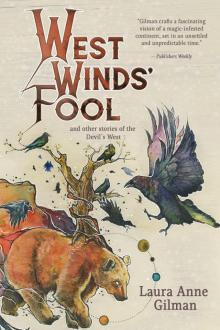 West Winds' Fool and Other Stories of the Devil's West
West Winds' Fool and Other Stories of the Devil's West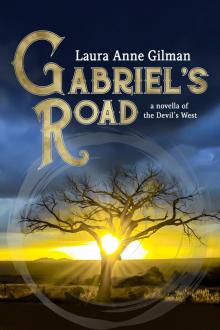 Gabriel's Road
Gabriel's Road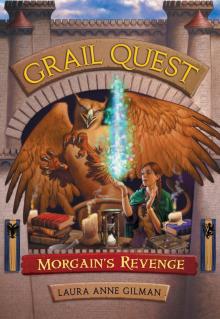 Morgain's Revenge
Morgain's Revenge The Shattered Vine
The Shattered Vine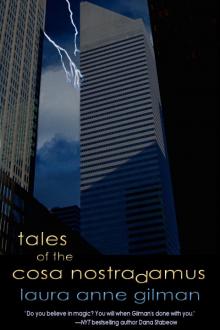 Laura Anne Gilman - Tales of the Cosa Nostradamus
Laura Anne Gilman - Tales of the Cosa Nostradamus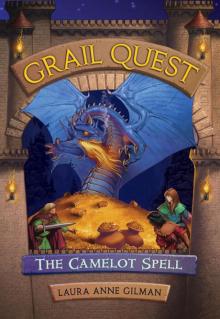 The Camelot Spell
The Camelot Spell VISITORS
VISITORS Staying Dead
Staying Dead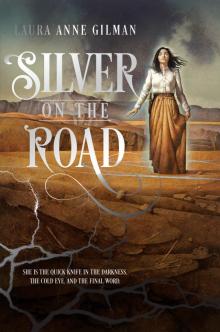 Silver on the Road
Silver on the Road Weight of Stone
Weight of Stone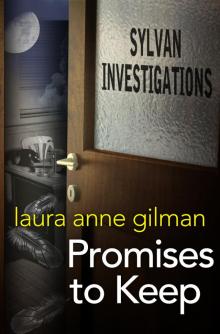 Promises to Keep
Promises to Keep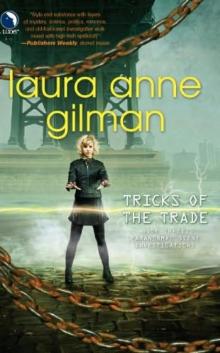 Tricks of the Trade psi-3
Tricks of the Trade psi-3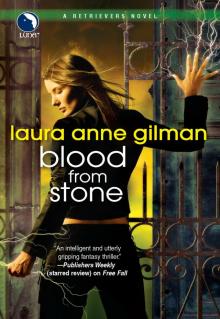 Blood from Stone
Blood from Stone Soul of Fire tp-2
Soul of Fire tp-2![Pack of Lies [2] Read online](http://i1.bookreadfree.com/i1/04/01/pack_of_lies_2_preview.jpg) Pack of Lies [2]
Pack of Lies [2] Burning Bridges
Burning Bridges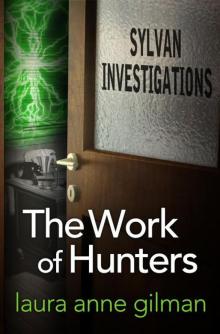 The Work of Hunters
The Work of Hunters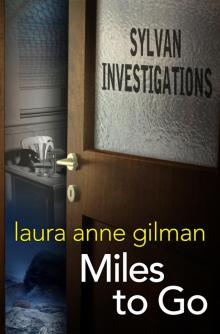 Miles to Go
Miles to Go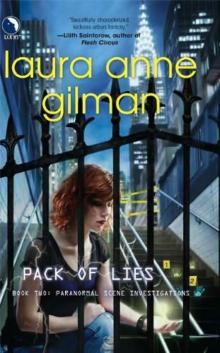 Pack of Lies psi-2
Pack of Lies psi-2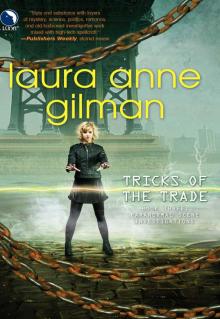 Tricks of the Trade
Tricks of the Trade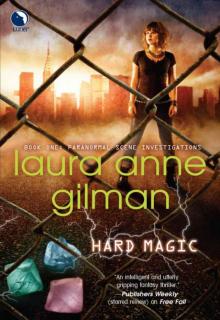 Hard Magic
Hard Magic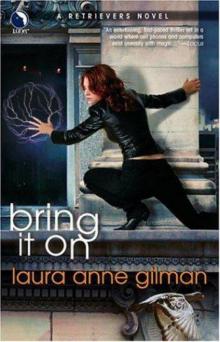 Bring It On
Bring It On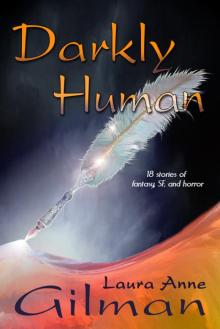 Darkly Human
Darkly Human The Cold Eye
The Cold Eye An Interrupted Cry
An Interrupted Cry Soul of Fire
Soul of Fire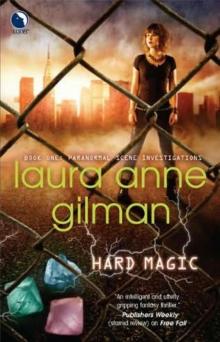 Hard Magic psi-1
Hard Magic psi-1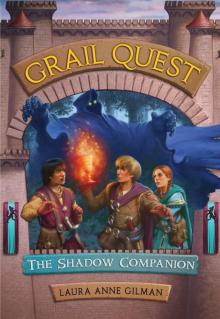 The Shadow Companion
The Shadow Companion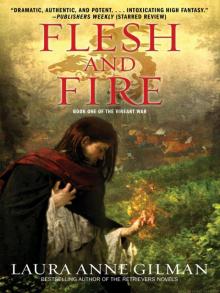 Flesh and Fire
Flesh and Fire